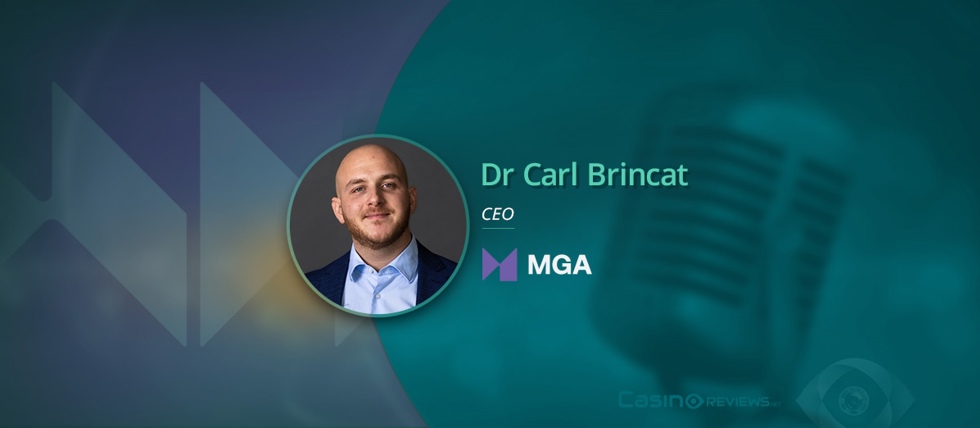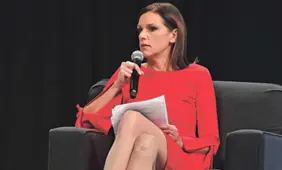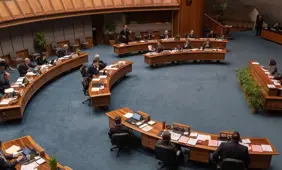Embracing the Future - Dr. Carl Brincat on MGA's Vision for Sustainable, AI-Driven iGaming

We are proud to present the next exclusive conversation as part of our interview series, featuring Dr. Carl Brincat, CEO of the Malta Gaming Authority (MGA). The MGA stands as a beacon of excellence in the global gaming regulatory landscape and continues to set unparalleled standards. In this enlightening dialogue, we explore the company's unwavering commitment to sustainability, their meticulous licensing protocols, and proactive approach to player protection. We also delve into the promising horizons of AI in the gaming sector and the MGA's forward-thinking stance on cryptocurrencies. This interview promises a deep dive into the visionary strategies that have positioned the MGA at the pinnacle of the industry so, let us start.
Last year at ICE 2022, you had mentioned achieving the right balance between regulation and sustainability as being the number one priority for MGA. How do the voluntary ESG (Environmental, Social, and Governance) reporting platform and the Code of Good Practice contribute towards achieving that goal?
Today’s businesses are being held accountable to a higher standard. Regulators, investors, business partners and civil society are calling for increased accountability to address key challenges for society and the planet.
Embracing ESG within business strategies in a timely manner permits businesses to have a net-positive effect on society and provides an opportunity to stand out as an entity that cares about the human and natural environment it operates in.
Some of our licensees already report on ESG publicly, whether due to obligations stemming from existing legislation, or on a voluntary basis. However, on a wider scale we felt that the sector lacks common priorities for ESG that are sector-specific. We aim to close this gap with our voluntary ESG Code of Good Practice, on which we are currently consulting with the industry.
Part of our approach involves giving back to the industry, by providing them with information that they can use to improve their performance and reap the benefits of running a sustainably conscious operation, and also by acknowledging the efforts that they make in this regard.
Our ESG code also aims to guide and prepare licensees for upcoming ESG legislation, particularly the EU’s Corporate Sustainability Reporting Directive. We are also confident that by having this Code as guidance on what is meant to be acted upon and reported, it will also serve to help companies showcase what they are already doing well, and also to guide them on areas of focus for improvement going forward.
This has been widely discussed but still remains a hot topic to talk about with regulators. What are the main pillars you look for in operators in order to grant them an MGA license, and more importantly, what would warrant the suspension of an operator’s license?
The MGA has developed and put into place a streamlined and rigorous approach to our authorisation and compliance processes, to ensure that all operators holding an MGA licence are fit for purpose.
The Fit and Proper aspect focuses on the people behind the company, the source of the funds they are investing into the company and their source of wealth. This typically applies to the company’s qualifying shareholders – both beneficial owners in terms of equity, as well as persons holding significant voting rights – as well as the people running the company (the directors and persons performing key functions).
We conduct a thorough assessment of the individuals involved in the operation, focusing on their integrity, reputation, competence, and capability. This involves background checks, verification of qualifications and experience, and evaluation of any criminal records or regulatory infringements.
Through the Business Plan aspect, we look at their expertise to carry out the business offering, focusing on the projections that the company presents, the viability of the business and its funding.
The Technical aspect enables the MGA to understand the technical setup and offering (i.e. the type of game or platform).
Specific focus is dedicated to those areas that significantly impact adherence to legislation directly associated with our regulatory objectives. These include AML/CFT (through the Business Risk Assessment, Customer Acceptance Policy and Customer Risk Assessment, amongst others), responsible gambling, and – where relevant – sports integrity practices.
An operator’s licence may be suspended on various grounds, including if people running the company have ceased to be fit and proper, if the operator has failed to discharge financial commitments for its operations, failed to meet commitments to players in a timely manner, failed to notify/seek approval from the Authority for any change where such prior approval/notification is required, or failed to comply with any of their obligations at law.
In essence, where a failure is serious enough as to impinge upon the licensee’s ability to conduct its operations in a manner which is compliant with the law, that licence is suspended if the failure can be remedied, or cancelled if the failure is such that the Authority determines that the company can no longer remedy its failures, or be trusted to return to compliant operations.
The player protection framework is of great importance to the Authority. Earlier this year MGA published amendments to the Directive (Directive 2 of 2018), following feedback received through the dedicated consultation process. How much do you rely on your responders when it comes to strengthening the framework? And what is the key purpose of the new amendments?
We place great importance on our consultation exercises as these foster an environment of approachability and open dialogue. Different stakeholders bring real-world experiences and expertise, and also provide valuable insights and diverse perspectives, helping us make more informed and evidenced-based decisions.
The amendments to the Player Protection Directive were also based on extensive research we conducted, and also took into consideration the European Gambling and Betting Association’s (EGBA) proposal to the European Committee for Standardisation (CEN) to standardise markers of harm in the gambling sector.
The purpose of these amendments was to clarify the Authority’s expectations as to the minimum factors that must be considered by licensees when detecting and identifying problem gambling, as well as actions or behaviours which may indicate that a player is at risk of developing gambling problems.
The purpose of these amendments was to clarify the Authority’s expectations as to the minimum factors that must be considered by licensees when detecting and identifying problem gambling, as well as actions or behaviours which may indicate that a player is at risk of developing gambling problems.
In a recent interview, you mentioned AI (Artificial Intelligence) as a tool that can be implemented and used by the Authority as well as operators for developing more effective markers of gambling harm. Is the MGA planning on integrating such technologies in the process of detecting, measuring and controlling problematic gambling?
AI systems can play a significant role in aiding responsible gaming practices and preventing gamblers from developing gambling harm. In fact, nowadays, most gaming operators are using AI technologies for player behaviour analysis and early intervention.
AI is able to analyse player behaviour patterns and identify potential signs of problem gambling, such as excessive spending, increases in deposits and wagers, and chasing losses, amongst other markers of harm.
The MGA is cognisant of the fact that AI can play a significant role, and hence we are also exploring ways of how we can integrate AI systems into our Responsible Gaming Audits process. This offers data capabilities that can improve the effectiveness, as well as the efficiency of our audits. Apart from using AI to analyse large volumes of data, making it easier for our auditors to detect potential shortcomings and/or inconsistencies, we are also looking at the possibility of using AI systems for audit sampling. We are aware of the fact that our licensees are supervised by a number of regulators worldwide, and therefore leveraging technology to make our prudential oversight more effective, whilst at the same time less burdensome on the licensees being reviewed, is always high on our agenda.
What is the MGA's stance regarding the acceptance and use of cryptocurrencies and tokens as means of payment at online operators? How do you believe the gaming sector could benefit from these emerging technologies?
The MGA has consistently embraced innovation and made sure to stay ahead in the field of gaming regulation. As a result, we have been among the pioneers on a global scale in our efforts to regulate the use of cryptocurrencies as means of payment, as well as the use of innovative technology arrangements (ITAs), including blockchain and smart contracts, within gaming operations.
In January, the MGA published its Policy on the use of Distributed Ledger Technology (DLT), which presented our final position with regard to the acceptance of virtual financial assets (VFAs), virtual tokens and the use of ITAs, including DLT platforms and smart contracts. This followed a period during which a sandbox framework was in force, which served as a learning experience for us and our licensees alike.
This industry has long been one of the early adopters of new and emerging technologies.
In a world that is increasingly driven by technological advancement, and where competition is fierce, we think there is not really much choice in the matter – adaptation, and therefore adoption of these technologies, is a must.
This is why we acted early by identifying the actual risks involved, as there are many risks that are only perceived and are not real, and developing regulation to cater for them accordingly.
According to your 2022 report, the number of active online player accounts registered with MGA licensed operators went up 2.6% in 2022 compared to 2021, reaching its highest ever and surpassing the 2020 record numbers. What do you attribute to the rise in player interest?
The estimated number of new active player accounts in 2022 stood at 18.1 million, representing a growth of 9.7% when compared to 2021. This is in line with the trend, which has seen an increase in new active player accounts year on year.

It is hard to attribute the rise in player interest to any specific factors without dedicated studies that analyse this in detail and, invariably, the reasons will differ for each licensee that has experienced individual growth.
There are multiple variables that may come into play, including the increased convenience and accessibility of accessing gaming platforms, especially through the proliferation of smartphones, the technological advancements leading to high-quality graphics and immersive gameplay, and the broad range of games available that cater to diverse interests.
We believe it is also a testament to the continued innovation driven by our licensees, which work hard to deliver a good entertainment experience within a safe regulated environment, and that therefore drive strong organic growth.
There was a significant increase in players visiting brick-and-mortar casinos in 2022, compared to 2021, based largely on the lifted COVID restrictions worldwide. Do you expect the emerging trend to continue rising in 2023, or did the pandemic result in an irreversible advantage for the online gaming sector?
The total number of visits to local casinos in 2022 stood at 790,642, an increase of 65.5% compared with the corresponding period of 2021. This marked increase is clearly linked to the reopening of casinos following the easing of COVID-19 restrictions that were still in place during the corresponding period in 2021.
The total number of visits to local casinos in 2022 stood at 790,642, an increase of 65.5% compared with the corresponding period of 2021. This marked increase is clearly linked to the reopening of casinos following the easing of COVID-19 restrictions that were still in place during the corresponding period in 2021.
Accurately predicting complex human behaviours such as gaming preferences is challenging. We expect that, as tourism increases again, 2023 will see levels more in line with pre-COVID trends.
Accurately predicting complex human behaviours such as gaming preferences is challenging. We expect that, as tourism increases again, 2023 will see levels more in line with pre-COVID trends.
What are the main challenges that you expect the Malta jurisdiction will face in terms of regulation during 2023?
Malta was the first EU Member State to specifically regulate the remote gaming industry in 2004 and we have since strived to establish ourselves as one of the prime jurisdictions for remote gaming operators.
As other jurisdictions catch up and seek to set up robust, comprehensive regulation for the industry, this can lead to increased competition.
Malta needs to continue to adapt in order to maintain its competitive edge, which is why we work tirelessly to streamline our regulation processes, whilst continuously updating our regulatory framework to ensure a level playing field that nurtures innovation while safeguarding against any potential risks.
We strive to maintain an open dialogue with the industry and other jurisdictions to understand emerging trends, share best practices and work collaboratively on addressing common challenges. Human capital is one such common challenge, which can be addressed by investing in education and training programs to develop a skilled workforce that caters for the demand. The MGA carries out numerous outreach activities with education institutions and students throughout the year, focusing on how the industry can present a viable and rewarding career path. We also emphasise responsible gambling practices and social responsibility to help attract individuals who are genuinely interested in making a positive impact within the industry.
We thank the Malta Gaming Authority and, in particular, Dr. Carl Brincat for sharing such comprehensive insights. The MGA's dedication to fostering a responsible and innovative gaming environment is truly commendable. Their relentless pursuit of excellence and commitment to staying ahead of the curve is a testament to their stature in the global gaming community. At CasinoReviews, we are privileged to facilitate such enriching dialogues that shine a light on the industry's best practices and future trajectories.
More Interviews
 Interviews
Interviews
Sweepstakes Casinos: Thriving in an Ever-Changing Industry – Interview with Attorney Stephen C. Piepgrass
Feb 17, 2025 Interviews
Interviews
When Helping Others Is a Life-Long Mission - An Interview with Gordon Moody CEO, Monica Shafaq
Dec 17, 2024 Interviews
Interviews
Charting a Path to Success: An Interview with Christina Muratkina, CEO of Onlyplay
Aug 21, 2024RELATED TOPICS: Interviews
Most Read
Must Read
 Interviews
Interviews
Sweepstakes Casinos: Thriving in an Ever-Changing Industry – Interview with Attorney Stephen C. Piepgrass
Feb 17, 2025 Interviews
Interviews






Review this New Post
Leave a Comment
User Comments
0 Comments for Embracing the Future - Dr. Carl Brincat on MGA's Vision for Sustainable, AI-Driven iGaming